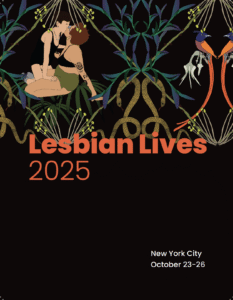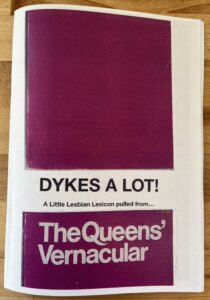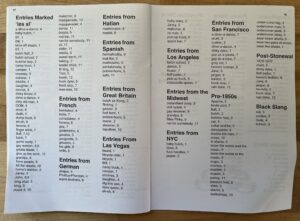
Last month, the Graduate Center hosted the Lesbian Lives conference, an international gathering of academics, filmmakers, artists, and activists to share, discuss, and celebrate lesbian history and culture. Organized by Journal of Lesbian Studies, Sinister Wisdom, and CLAGS: the Center for LGBT Studies, the conference was being held in North America for the first time since 1993! I had the opportunity to attend the conference, and present about a digital humanities project I am developing, which uses digital tools to analyze the archival records of the Lesbian Switchboard, a telephone hotline that operated for twenty-four years in New York City. While I was attending the conference, I was particularly interested to learn about other digital humanities projects focused on lesbian history. Here are a few:
Queering the Map
Reese Schaffer presented their research on the platform Queering the Map. The site is a global mapping project, based on Google Maps, which allows users to anonymously share a memory or reflection tied a specific location. The site is self-described as “a community generated counter-mapping platform for digitally archiving LGBTQ2IA+ experience in relation to physical space.” As an undergraduate thesis, Schaffer spent hours exploring posts in the United States, noting how the site functions as a site of digital longing, connection, and engagement. Minimal moderation and the lack of metadata (posts are neither attributed nor timestamped) leads to creative uses: people “talk” through geographically proximate posts, and experiment with creative identities in liminal spaces such as the ocean (for instance, posting as a shark). Schaffer noted the many tensions in the site, and the role of fickle infrastructure in shaping the user experience. In addition to the anonymous timelessness of the posts, the site loads slowly which influences how users can move through the digital space of the site and mediates access to content.
Dykes A Lot!: Encoding Lesbian Lexicon
June Murphy shared their project using TEI to encode portions of the Queen’s Vernacular: A Gay Lexicon. Originally published in 1972, the Queen’s Vernacular is a lexicon of gay slang that was compiled by amateur lexicographer Bruce Rodgers based on twelve years of research. It was, in Murphy’s words “one of the first ‘serious’ studies of gay slang ever written.” Using TEI Lex-0, an XML standard for encoding dictionaries, Murphy encoded all the entries in the Queens Vernacular pertaining to lesbian slang. Encoding these entries enabled Murphy to create a topical index, which allows users to learn about geographically-specific terminology (such as “dutch baby”, “dove”, “fuck handles”, and “jasper” – all NYC-specific lesbian slang), as well as early lesbian slang and slang from French, German, and Haitian Creole. Murphy also shared their findings with us in zine form.


Feminist Bookstore News: Visualizing 30 Years
Salome “Sam” Grasland presented about a large-scale project by Sinister Wisdom to build a database of all the articles that had appeared in the twenty-four year run of the publication Feminist Bookstore News. A vital element of the Women in Print movement, Feminist Bookstore News published information about newly published titles, bookstore announcements, awards, gossip, reviews, and much more. The Feminist Bookstore News corpus includes 134 issues comprising over 10,000 pages of material! To create a database of articles, a team of forty volunteers scanned issues held at the San Francisco Public Library and entered data about each article into a Google spreadsheet. Grasland normalized the data, and pulled bibliographic information for some referenced books using the ISBNs. With a colleague, she then created a Tableau dashboard for the data, which is available here. The descriptive data is also published and available through the Post45 Data Collective. You can view the dataset and learn more about the technical process on the Post45 Data Collective website.
Thank you to the presenters for sharing these projects which I look forward to continuing to explore! These projects resonated with my own efforts to use digital tools to preserve and interpret lesbian history, highlighting how technology can extend the reach of queer memory.



